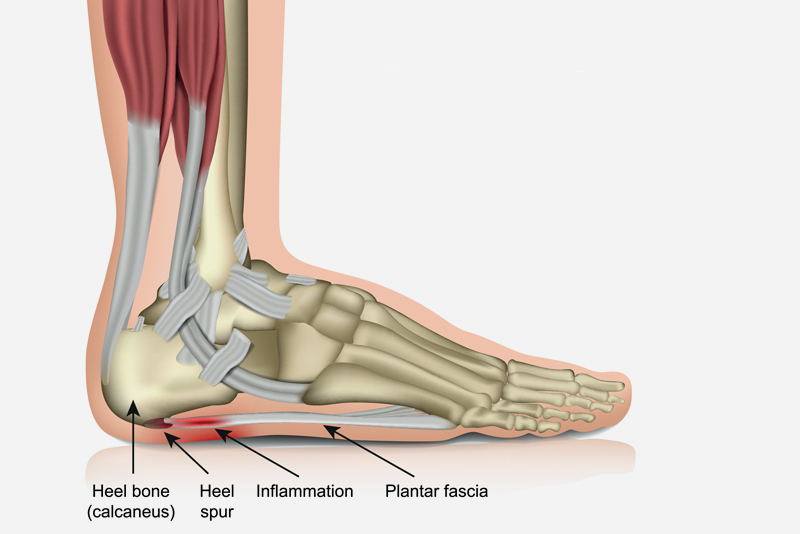What is Plantar Fasciitis?
Plantar Fasciitis is a condition of the plantar fascia – the tissue that runs along the bottom of the foot, connecting the heel to the toes, forming the arch of the foot. When this tissue is over-stretched or strained, small tears can occur in the fascia causing inflammation and pain.
Most people feel it in the morning when they first get out of bed, or after long periods of sitting down. The pain in your feet can be anything from an acute short and stabbing pain to a constant throbbing ache. Often it resolves itself after walking around for a few minutes, and with some self-help techniques at home, but not always.
How does it happen?
From what is currently known about Plantar Fasciitis, the most common reasons for causes are the following:
- Repetitive stress to the arch that is unfamiliar exercise
- Repetitive stress to the arch by running, hiking or walking, especially on concrete
- Standing on hard surfaces such as concrete for long periods of time
- Degradation of the tissue that occurs with ageing
- Flat feet or high arches can add extra strain to the fascia
- Carrying too much weight adds strain to the fascia
- Wearing shoes with poor arch support when you need it
- Calf tightness can also be a contributor to straining the underside of the foot
Self-help – what you can do at home
Rest – get off your feet and give them a rest when the inflammation is at its worst and you’re feeling pain.
Ice packs – wrap a plastic bag of crushed ice in a tea towel and place on the heel and arch for 10-15 minutes. During times of more inflammation, you can do this 3-4 times per day.
Soak in cold icy water – soak your heel for about 10-15 minutes, making sure to leave your toes out.
Stretching – stretch your arches, Achilles tendon and calf muscles. For your arches, role a tennis ball under your foot, it feels nice too. Gentle stretching is an important part of relieving the strain.
Wear shoes with good support – lessen the strain that your foot is already unable to cope with by wearing shoes with good quality arch and heel support.
Choose a different sport or activity – if your current sport or activity is causing pain, then choose something that has less of an impact such as swimming, cycling or yoga. Excellent for fitness and gentler on your feet. Your feet are with you for a long time so a change in your sporting activity is worthwhile and, it may only be a temporary measure until the pain settles. A return to your normal sport is highly valued and supported at our clinics.
How we help you with Plantar Fasciitis
Shoe orthotics – we can fit your feet with custom orthoses to support your arches and distribute the weight evenly over the foot tissues and bones. We’d do an assessment and have a good look at the impact of this condition on your standing posture and gait.
Athletic taping – we may suggest ways to use athletic tape to help support the plantar fascia and lessen the strain.
Physical therapy – we use strengthening exercises to improve muscle function and the ability to cope with the stresses we place on our feet. We gently mobilise the foot to maintain mobility and flexibility. We massage your feet to release tightness and reduce inflammation and will also use Ultrasound therapy as part of treatment. We’d also teach you how to stretch and strengthen your feet at home to continue the healing process.
Night splints – people often sleep with their feet pointed down which strains the plantar fascia and Achilles tendon. Night splints can be worn when you sleep and will keep your feet at a 90 degree angle, creating as nice stretch in the plantar fascia. You can stop wearing them when the pain is gone.
Further remedies – if these treatments don’t work, we may suggest padding and cushioning to relieve pressure relief and reduce the impact on your heel. We may also suggest pain relief such as anti-inflammatory medicine while we continue to investigate the problem.
Feeling pain in your heel or arch?
It could be Plantar Fasciitis or something else and it’s best to get on top of the problem before it gets any worse. Our gentle and experienced podiatrists will help identify the source of pain, and advise you on the best treatment, which includes self help at home.
We will always look for the least invasive ways to help your feet get back in balance. Call one of our podiatry clinics in Adelaide, Stirling, or Mount Barker to book an appointment and have it looked at.
Sander Podiatry Adelaide – 08 8379 1456 (Greenhill Podiatry)
